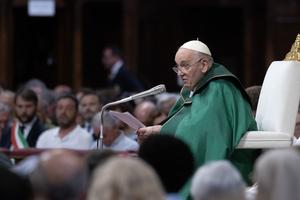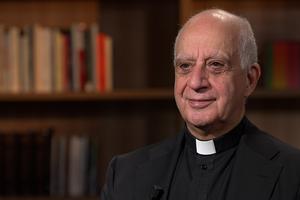One Brave Doctor
Dr. Mary Martin, who has an NFP-only medical facility, is one of many Catholic physicians whose practices could be radically changed, depending on how Congress reforms the health-care system.
Dr. Mary Martin is on the front lines of the nation’s health-care fight.
She’s one of tens of thousands of physicians whose practices — and lives — could be forever changed, depending on what kind of health-care reform comes out of Washington.
For Catholic physicians like Martin, the life issues are a central aspect of that reform. In fact, it was the life issues that were at the center of Martin’s conversion as a Catholic physician.
A board certified obstetrician-gynecologist and a fellow of the American College of Obstetricians and Gynecologists, Martin runs the Billings Center for Fertility and Reproductive Medicine at the St. Anthony Hospital campus in Oklahoma City. She recently spoke with Register senior writer Tim Drake about her work and the clinic.
Tell me about your spiritual journey.
I went to a large Catholic high school in Dubuque, Iowa, during the 1970s. It was strong academically, but theologically it didn’t do a good job of teaching the Catechism. I was a woman of the 80s and proudly said that the Catholic Church doesn’t do my thinking for me. I was particularly at odds with the Church on the typical issues. I felt the Church was wrong on the issues of contraception and remarriage and most of the issues that Catholics dissent on.
I realize now that I lacked the grace to see the truths of the Church. I also came from a contracepting family. At the age of 7, I saw my mother taking a round dial of pills at dinner every night. When I asked what they were, I was told they were gall bladder pills. There was always a sense that we were not wanted and that the worst thing that could possibly happen to our family was for us to have another baby.
Why did you go into medicine?
I was teaching agriculture as a young mom with two young babies (I got married because I was pregnant) and was in an unhappy marriage and knew it wouldn’t last. I wasn’t committed and was looking for a way out. I had been considering veterinary school, but realized it would have been a conflict of interest because my husband worked in agriculture. So, at the age of 30, I started medical school.
Early in your practice, you prescribed contraception?
Yes. When you see 12-year-olds who are pregnant and 19-year-olds who are on their fifth pregnancy, you think you must save these women from future pregnancies. That’s why so many ob-gyns are brainwashed that contraception is good medicine. During my residency training, I did refuse to participate with abortion.
What led you back to the Church’s position on contraception?
I went to Mass because I had to take my children, who were attending Catholic school. A faithful priest, at the time of my divorce, convicted me on the issue in the confessional. It wasn’t an immediate conversion. I ended up going to daily Mass and regular confession. Eventually, I realized that I wasn’t going to be making any progress spiritually if I continued prescribing contraception. On March 1, 1999, I stopped.
I’ve said for the past 10 years that there is no medical reason ever to prescribe a contraceptive. There’s always an underlying problem. Without contraception, you make a diagnosis and treat it rather than covering it up with pills.
Did you have any fears that you would lose business?
Yes; I was in a very successful solo practice. I was sure that I would go broke and simply slink away out of town. I told each patient individually. There were a few Catholic professional women who switched and a few teen girls whose mothers felt I was being irresponsible for not sending their daughters on to college with contraceptives. I transferred about 13 charts in all.
We wanted to see what impact the decision would have on our business, so we stopped seeing new patients for about six months. We were turning away 15 to 20 patients per day. We learned that people wanted to see a doctor who practices according to faith. During my last four years, I was a top producer in a 35-year practice. My partners saw that I was filling a niche for them and that I was reaching patients who wouldn’t come to them anyway.
What led to an NFP practice?
When I made the decision not to prescribe contraception, I didn’t know what I was going to do. I knew nothing about natural family planning. I attended a Couple to Couple physicians’ conference, but had a lot of trouble with it because it wasn’t OB-GYN. They were presenting a lot of information I had never heard before. Then I attended the Pandora’s Pillbox conference in Chicago. I was the feminist woman caught for posterity on the tapes of that conference arguing with the presenters. At the end of that meeting I met Father Daniel McCaffery and Sue Ek. It was after that, while attending a Billings Ovulation Method teacher training that everything clicked for me. Now I had a way to practice gynecology with some real tools.
What impressed me most was that the very same founders of reproductive endocrinology — [James] Brown and [Erik] Odeblad — were the same men who had brought the birth control pill into being and had misgivings about women taking high doses of hormones and so turned their attention to natural ways of fertility detection. Understanding all of this has put me at the forefront and given me tools that my colleagues don’t have. That has been especially helpful in detecting and treating fertility disorders.
Couples, with the assistance of the real science of fertility and reproductive technology, have conceived without having to result to other methods. I’m a practical person who has figured out a way to use this so that I don’t have to compromise my soul. I take no credit for it.
What led to the creation of the Billings Center?
I’ve been very honored to have been invited to speak at many places over the past several years, while still doing surgery, delivering babies, and seeing 35 to 40 patients per day. I’ve often been asked by many physicians where they can learn to do this. After a conference last May [2008], I realized it would be great if physicians had a place they could go to learn this. After working at St. Anthony Hospital for six months, I inquired about space so that we could do lab research and put the Billings method into clinical practice.
We have six exam rooms, a waiting room and four physician offices. We can accommodate residents and nursing students. We have one of the few ovarian fertility monitors in the country. As an accredited teaching facility, I’m hoping that we can create a curriculum that could be introduced into medical and nursing schools.
This has really taken off with the family practice residents. Virtually all of them are already NFP. They’re becoming enculturated in this. We’re attracting doctors who want to practice without using contraceptives.
We’re providing obstetrics, gynecology and fertility consistent with the Church’s teaching, all under the umbrella of a faithful Catholic teaching hospital.
Tim Drake writes from
St. Joseph, Minnesota.
For more information, contact Dr. Martin’s office at (405) 272-7026.
- Keywords:
- September 27-October 3, 2009













